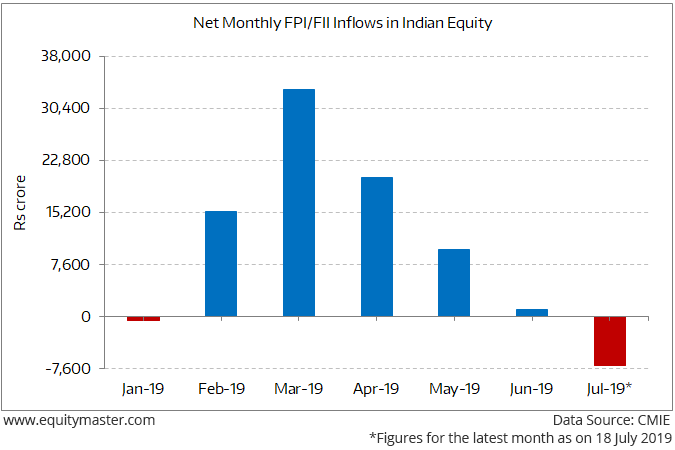Sensex Ends 418 Points Lower; Banking And Power Stocks Witness Huge Selling
India share markets continued to witness selling pressure during closing hours and ended their day deep in the red.
At the closing bell, the BSE Sensex stood lower by 418 points (down 1.1%) and the NSE Nifty closed down by 134 points (down 1.2%).
The BSE Mid Cap index ended the day down 1.3%, while the BSE Small Cap index ended the day down 1.7%.
Note that the decline in small-cap segment has been sharper since the Union Budget, with the BSE Smallcap index hitting its lowest level since February 2017.
But Richa Agarwal says this fall currently offers the best bargains to the market.
In the video, she talks about picking the right stocks to benefit from the upcoming rebound.
You can know more about small caps here: One Stock Crorepati, Best Stock to Buy, Falling Smallcap Stocks, Smallcap Stocks Under Modi 2.0, and Crorepati stocks.
Sectoral indices ended on a negative note with stocks in the banking sector, power sector, and energy sector witnessing most of the selling pressure.
The rupee was trading at 70.46 against the US$.
Asian stock markets finished on a negative note. As of the most recent closing prices, the Hang Seng was down by 2.85% and the Shanghai Composite was down by 1.62%. The Nikkei 225 was down 1.74%.
European markets were also trading on a negative note. The FTSE 100 was down by 1.85%. The DAX was trading down by 1.31%, while the CAC 40 was down by 1.77%.
Market participants were tracking Nesco share price, Dilip Buildcon share price, KEI Industries share price, and Torrent Power share price as these companies announced their June quarter (Q1FY20) results today.
You can read our recently released Q1FY20 results: Ceat, Apollo Tyres, ITC, Nestle.
In the news from the finance sector, DHFL share price was in focus today.
The scrip of the company slumped 11% in Monday's trade after Deloitte quit as the auditor of cash-strapped company.
As per the news, communication regarding Deloitte quitting as DHFL's auditor has been sent to the Ministry of Corporate Affairs.
Moving on to the news from the macroeconomic space, the Indian government is likely to put on hold a plan to raise the minimum public shareholding in listed companies amid concerns it could force the issuance of billions of dollars worth of shares.
Note that Indian share markets fell sharply when Finance Minister Nirmala Sitharaman announced the proposal to raise the minimum public shareholding in companies to 35% from 25% in a budget speech last month.
The rule if implemented could result in companies having to offer approximately Rs 1 trillion in shares currently owned by controlling shareholders to the public.
The government is also looking at a number of other issues such as foreign portfolio investors' (FPI) tax concerns.
The government's proposal to increase taxes on those with annual incomes of more than Rs 20 million has rattled many foreign portfolio investors.
We will keep you updated on all the developments from this space. Stay tuned.
There's been a heavy sell-off in the Indian stock markets following the Union Budget 2019 and the biggest sellers in the ongoing correction are foreign investors.
Why are foreign investors dumping Indian stocks?
Ankit Shah answers this question in one of the editions of The 5 Minute WrapUp. Here's an excerpt of what he wrote...
- One of the main reasons is the higher tax burden on the super-rich in the form of additional surcharge.
All individuals and association of persons (AOPs) come under the purvey of this additional surcharge.
Why does this bother foreign investors?
Here's the thing - several foreign portfolio investors (FPIs) are structured as AOPs, limited liability partnerships and trusts.
As such, if they earn over Rs 2 crore a year, they will be subjected to the higher tax surcharge.
Due to the above development, FPIs have been on a selling spree during the last month. Have a look at the chart below that shows the net monthly flows of foreign investors in the Indian stock markets:
Foreign Investors Turn Net Sellers After Five Months of Buying

One must also see the sell-off in the larger context - foreign investors have been net buyers of Indian equities in 2019.
Since the start of the year, their net investment in Indian equities is worth Rs 719 billion. They have been net buyers in five out of seven months.
So, the ongoing sell-off should not be seen as foreign investors exiting India for good. They will come back when the valuations get more attractive to compensate for the higher tax burden.
So, look out for the stocks that will rise fast when the tide of the market turns up.
In the news from the commodity space, India's gold imports slumped to their lowest since 2016.
As per the news, overseas purchases fell 69% to 20.4 tons in July from 65.6 tons a year earlier.
This would be the smallest monthly quantity shipped since at least March 2016, when imports fell to 17.7 tons as jewelers went on a nationwide strike to protest against an excise duty on jewelry.
How this trend pans out ahead remains to be seen. Meanwhile, we will keep you updated on all the developments from this space.
Speaking of stock markets and gold, gold has always been a staple investment for Indian households.
There are various opinions on what proportion of the portfolio could be allocated to the yellow metal.
Here's what co-head of research at Equitymaster, Tanushree Banerjee wrote about this in one of the editions of The 5 Minute WrapUp...
- The magical metal will be no match for the Indian mettle over the next decade.
So, by all means buy some gold for inflation hedge.
But don't lose sight of the Rebirth of India opportunity.
To know what's moving the Indian stock markets today, check out the most recent



